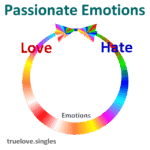Some love can lead to domestic violence. If it does, it perhaps wasn’t real love but likely romantic or erotic love, or perhaps unrequited or unbalanced love.

What is romantic love? An inherently unstable love, experienced often in the early stages of the encounter between two people. The two want to be together, but they are not — as they are not sure of themselves or the other and as there is no decision in sight to commit. Romantic love may also be unrequited to some degree, thus making the encounter even more volatile. However, in case of romantic love, the lover(s) just cannot help it – therefore he/she/they ‘have fallen in love.’
What is unrequited love? It is one-sided love, or love that is not openly reciprocated or understood as such by the beloved. The beloved may not be aware of the admirer’s deep and strong romantic affection, or may consciously reject it. Unrequited love makes the lover suffering, as one might imagine. But then, isn’t idolatry just that?
Is there love in friendship? Perhaps not much, really, at least not to the intensity that real love demands to be so signified. In friendship, people simply like and trust each other, they may care for each other, but perhaps not love each other – as in ‘I love you.’ But it is not unheard of that friendships turn into real love. People might skip the state of romantic love entirely and realize, after some time of just being friends, that they are ‘made for each other’.
If and when love prevails — as I always hope it will, that is perhaps after a romantic state of affairs ran its course, that love then might be acknowledged and mutually endorsed by the engaged couple as real love.
What is that real love? A kind of stable love whereas, after all, significant affection and esteem for the other are equally shared by two people in an ongoing relationship with at least some commitment to mutual dependency. Whoa, what a long definition. Is that needed? No, most often not. It is enough when the partners say ‘I love you’ and actually mean it. But then again, we want some clarity, some assurances — sometimes we want to know what is meant.
What is love-gone-wrong? It is almost self-explanatory: jealousy, boredom, indulgence, domination, infidelity, disappointment from missed expectations are some of the issues that can lead to the break-up of any loving relationship, and especially a burgeoning romantic love relationship. A lover on the receiving end of love-gone-wrong, for whatever reason, needs to be very careful and is well advised to seek support from friends and family.
When Love turns Sour

When love turns sour, love is not safe anymore — if it ever is. Too many people, especially young people, find themselves in interpersonal, intimate relationships without a good-enough inoculation against the perils of love and life. It happens too often that love turns into contempt, and it is not easily preventable.
What makes love so risky and unsafe?
That is where a religious community can make a difference: lead their offspring, their offspring’s friends and acquaintances into expectations about love and life that are grounded in common sense or ‘wisdom of the ages’ instead of and .
I am an advocate of modern courtship, which I believe should be promoted more to young singles in search of each other. Modern courtship might preempt the dangers of romantic love and, while initially promoting friendship, might eventually allow for a more deliberate or action-oriented love for those seeking some predictability in life.
When Love turns Negative

When love’s-gone-wrong, when love turns negative, domestic or intimate partner violence may be experienced by one of the partners, usually the woman. This takes the form of physical, sexual, and emotional violence in the home. However, women are also perfectly capable of emotional violence. It happens too often that affection or love turn into anger, fear, or even hate, and it is not easily preventable.
Emotions are a tricky force, with some professionals calling them inner functions that cope, for better or worse, with lived experience. Empiricist David Hume suggested that people have little control over their passions, with the faculty of reason only to be their slave. Provoke an emotion in another at your own risk. Love is not necessarily safe. In the worst cases, liking turns into contempt, and love into hate.
There are other forms of violence within interpersonal relationships which include:
- Bullying,
- Child Maltreatment,
- Community Violence,
- School Violence,
- Sexual Abuse and Sexual Violence,
- Sex Trafficking,
- Teen Dating Violence.
For example, the U.S. Department of Justice, which oversees the National Sex Offender Public Website, estimates that only about 10 percent of perpetrators of child sexual abuse are strangers to the child.
The Justice Department estimates 60 percent of perpetrators are known to the child but are not family members but rather family friends, babysitters, child care providers and others, and 30 percent of child victims are abused by family members. Nearly a quarter of the abusers are under the age of 18, the department estimates.
It is sad and tragic when this kind of violence happens, obviously. It is traumatic for victims.
Having recently looked at the National Sex Offender Public Website, I was truly shocked by the number of sex offenders registered here in the San Francisco Bay Area. I live in a decent middle-class neighborhood, but it would only take me to walk a mile or so to possibly run into one of these creeps. Watch out if you plan on a family, or have already kids.
However, with respect to the general theme of this site, intimate partner and teen dating violence are of particular concern.
Intimate Partner Violence
According to Wikipedia, intimate partner violence (IPV) is domestic violence by a current or former spouse or partner in an intimate relationship against the other spouse or partner. IPV can take a number of forms, including physical, verbal, emotional, economic, and sexual abuse.
Love, real love as we qualify it on this site, was perhaps not present in these relationships, but romantic love or pseudo-love was. Falling in love, falling out of love, the love of being in love, and then some are all terms that apply.
But why can love turn so badly? A lot of couples may break up sooner than later and walk away from each other with minor emotional bruises only. But not all. Why is love, as many of my friends and acquaintances opine, so unsafe? In literature (Tolstoi’s Anna Karenina) and theatre (Shakespeare’s Romeo and Juliet) and the movies (Titanic), love has tragic endings more often than not.
Is Hollywood to Blame?

Well, perhaps tragic endings make for a lot more emotionally captivating entertainment than boring endings. Entertainment with happy endings usually end with the happy ending of the romantic period in a couple’s encounter. To that end (pun intended), these entertaining stories do not follow a couple’s relationship to the very, very end, let’s say to old age, which probably would make for a boring movie (with the movie The Notebook an exception). My friends’ and acquaintances’ opinions may be colored by the insistence of Hollywood’s success stories in that romantic love is always portrayed as a risky affair. But are people misled by mischievous and exploitative Hollywood and TV?
Not always. Romantic love just makes for blockbuster movies, and it would not be so if it were not for the generations of love-thirsty folks. But all love is unsafe. Unfortunately, a lot of people get hurt badly when romantic love fails, or when the lovers fail to grow up to be able to sustain real love. It is hardly Hollywood’s fault as there are many many real wholesome families out there in the world. They just don’t show up on the big screen.
In spite of all the suspicion that most loves generate, French philosopher Alan Badiou still argues that we must give love a chance. Fleeing life and love into a safe relationship offers no guarantee that sooner or later the relationship breaks down as well – for reasons perhaps different from breakdowns of more volatile and exciting relationships. Boredom in the first case, jealousy in the later? Any adventure is perhaps risky as well as exciting to some degree.
Teen Dating Violence
According to Wikipedia, again, teen dating violence is the physical, sexual, psychological / emotional abuse (or violence) within a dating relationship among adolescents. However, there has not been that much study on violence in adolescent dating relationships, and it is therefore not as well understood.
Love, real love as we qualify it on this site, is perhaps not present in these teen dating relationships, but romantic love certainly is. Again, falling in love, the love of being in love are all terms that apply.
I am not experienced or well-read on teen love or teen dating violence in particular, and so must excuse myself from musing about that troublesome phenomenon for now.
Can Love ever Win?

Perhaps. Given a chance, love — starting as romantic love in an unchartered territory or starting as friendship in an arranged marriage, or anything in between — still makes the world go ’round. Strange, though, people are not only willing to kill for the love of their kin or country, but also to die for their true love.
Blood relations, justice, wisdom?
[…] prevailing cases of men abusing dependent women do not help to install confidence in love, either. However, women know how to have it their way as […]